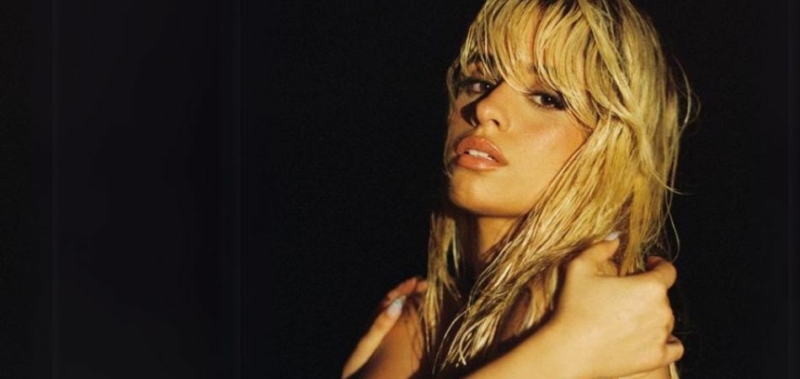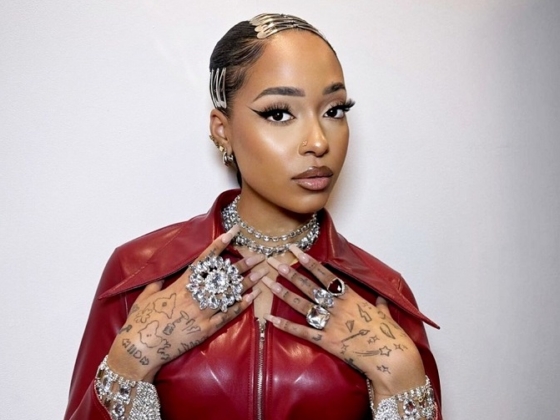At last night’s MTV VMAs, Camila Cabello performed her latest single, "GODSPEED," from her deluxe album C,XOXO – Magic City Edition. The performance took place against the backdrop of the highly publicized love triangle involving Shawn Mendes, Sabrina Carpenter, and Cabello herself, with all three in attendance.
Carpenter, who has been romantically linked to Mendes during one of his and Cabello's many breakups, performed her hit "Taste" from her latest album Short n' Sweet, speculated to be inspired by Mendes. Adding to the intrigue, Carpenter’s choreography subtly referenced Mendes and Cabello’s racy 2019 VMA performance.
Mendes himself seemed to acknowledge the heightened drama, captioning a post earlier in the evening: “Pulling up to my own funeral.” He also performed a new song titled “Nobody Knows,” which, TikTok users were quick to poke fun at, lived up to its name—because, well, nobody knew it.
Cabello began her performance with a pre-recorded clip of her platinum-haired self singing "June Gloom," the song currently blowing up on TikTok as her response to Sabrina Carpenter’s lyrical jabs in Short n’ Sweet. Almost instantly, the music cut to "GODSPEED," and Cabello, now back to her signature brunette, emerged inside a glass container. As the performance climaxed, she smashed the MacBook playing the original recording and stepped out of the container to sing the outro. The tension in the room was palpable, leaving many to wonder whether the audience greeted Cabello’s emotional ode to her younger self and past relationship with quiet empathy or uncomfortable silence.
However, to fully grasp the impact of “GODSPEED,” it's crucial to view both the song and the album within the broader context of Cabello’s career. Her performances and music reflect a constant push and pull between reinvention and nonachievment, with each release offering glimpses of her potential but often falling short of expectations. But before we can determine if C,XOXO repositions her trajectory toward A-list pop stardom, we must first confront the underlying reasons why her career seems to be stalling.
Was Camila Cabello destined to flop?
In June 2024, Camila Cabello released her much-anticipated fourth album, C,XOXO, which promised a bold sonic shift with its lead single, “I LUV IT,” featuring Playboi Carti. The track’s hyper-pop-adjacent flair hinted at an album full of experimental pop sounds and star-studded collaborations, signaling what seemed like a significant rebrand for Cabello. Yet, despite the hype, C,XOXO missed the mark, with only two tracks charting on the Billboard Hot 100, neither of which cracked the top 50. The lukewarm reception has led many to label the project a “flop,” continuing a pattern of her albums consistently underperforming.
Cabello's debut album, Camila (2018), launched her solo career, though it was quickly eclipsed by the runaway success of her hit single “Havana” and her high-profile collaborations with then-boyfriend Shawn Mendes. Her follow-up era, Romance, gained more momentum, with five songs charting on the Billboard Hot 100, but once again, her solo work was overshadowed by “Señorita,” which currently sits at over 2.8 billion streams on Spotify. Things took a downturn with the release of Familia, a Latin-inspired album whose eclectic, and at times perplexing, feature choices—such as Ed Sheeran and WILLOW—left many questioning the creative vision behind the project. The album’s lack of cohesion was further undermined by Cabello’s style choices during that period, which drew widespread criticism for their disorganized, unfinished feel. Viral quarantine paparazzi photos of Cabello with Mendes equally worsened her public perception, sparking a wave of negative commentary about her “messy” appearance that only added to her music’s commercial struggles.
So, why is she facing so many difficulties breaking into the mainstream?
Much of Cabello’s struggles stem from an unclear artistic vision and disjointed storytelling that leave her projects feeling like patchwork rather than fully realized ideas. While each era may toy with various concepts, the overall effect remains non-committal, as though she’s trying on different personas she’ll inevitably abandon. This lack of direction extends to her erratic choice of features and collaborations, both within her own work and with other artists, leaving listeners unsure of who Cabello is—both as an artist and as a person.
Additionally, opportunities that could have defined her career—such as capitalizing on her departure from Fifth Harmony or her breakup with Shawn Mendes—were either missed entirely or addressed too late, drowned out by more compelling projects or other people’s interpretations of her own life.
This problem is glaringly obvious in the ongoing saga involving Sabrina Carpenter, Shawn Mendes, and Cabello herself. Despite Cabello releasing her album first, her songs vaguely addressing the breakup with Mendes lacked the emotional depth or clarity needed to shape the narrative, leaving Carpenter to seize control. As a result, the public has unfairly cast Cabello as the “other woman,” even though Carpenter’s relationship with Mendes was never confirmed and rather short-lived. Carpenter’s lyrics in “Coincidence”—“Damn it, she looks kind of like the girl that you outgrew / least that’s what you said”—diminish and trivialize the significance of Mendes and Cabello’s relationship. This portrayal only fuels a growing perception of Cabello as an underdeveloped or unserious artist, further muddying her public image.
And despite being outshined by Shawn Mendes early in her solo career, Cabello had a prime opportunity this year to step out from his shadow and tell her story as his music career faltered. Mendes, whose last tour was canceled and whose recent single “Why Why Why” barely scraped the Billboard Hot 100, presented the perfect moment for Cabello to rise above. Yet she held back, perhaps unwilling to kick him while he was down, and the opportunity slipped away. With Mendes’ album release on the horizon, the uncertainty of how he may portray Cabello—and how that could impact her career permanently—remains.
“Though imperfect, C,XOXO is the most interesting thing Cabello has ever released.” – Zachary Hourihane, “The Swiftologist”
As many publications have noted since its release, C,XOXO isn’t necessarily a bad album—it just feels like the music industry’s hurried attempt to catch up with the current pop landscape, defined by the unfiltered vulnerability of Chappell Roan, Charli XCX’s brat-girl summer energy, and Sabrina Carpenter’s playful sexual innuendos, topics once considered taboo for women to openly discuss. Perhaps this shift in pop culture also makes C,XOXO's production choices, like its excessive use of autotune, feel more palatable.
Some standout moments on C,XOXO include the clever interpolation of Pitbull’s “Hotel Room Service” on “B.O.A.T.,” a nod to her Miami roots that adds an unexpected contrast to an otherwise melancholy song.
I know this might be a controversial take, but “HOT UPTOWN (feat. Drake)” is a great track that deserved more recognition. It captures the Miami vibe with its vibrant instrumentation, and unlike some of the other songs on the album, it feels polished and fully conceptualized. Unfortunately, I believe the song would have gained more traction if not for Drake’s recent controversy with Kendrick Lamar. Still, it’s telling that this collaboration was one of only two songs from the album to chart.
“GODSPEED” is also one of the album’s best tracks, serving as the perfect culmination of its core message: acknowledge your responsibility to grow while also learning to embrace inevitable chaos. It’s a fitting anthem for navigating the uncertainty of early adulthood with a sense of both urgency and lightheartedness.
Honorable mentions include Lil Nas X’s verse on “He Knows,” her C,XOXO Glastonbury performance, and the descending scale recurring melodic theme that first occurs before Carti’s verse in “I LUV IT” and continues until the end.
In many ways, Camila Cabello’s career feels like a series of near-misses—brimming with potential, yet held back by indecision, focus-grouping her audience, and the ever-present struggle to stay relevant. C,XOXO may not be the breakout album many hoped for, but it shows glimpses of an artist on the brink of something meaningful—if only she could push past her self-doubt, major label pressures, and the onslaught the public narratives that continually obscure her music.
The question is, can she do it before the industry moves on without her?











